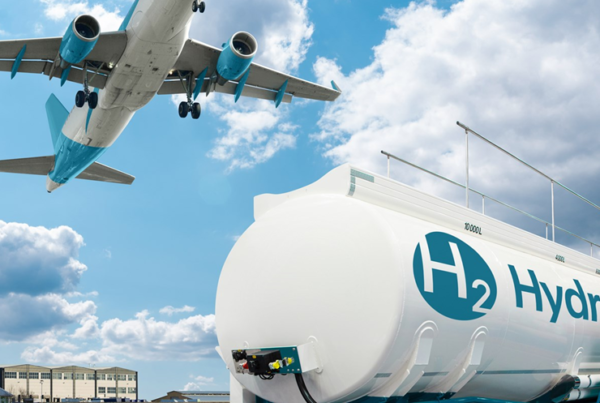
With many years’ experience with renewable energy, Claes Fredriksson – Liquid Wind Founder and CEO – has been longing for hydrogen’s potential to be realised.
He is excited to see that the hydrogen discussion is now developing into focused action. Claes proposes that hydrogen-derivates provide a scalable solution to accelerate the energy transition and drastically reduce carbon emissions.
Lately, it feels like the escalating hype and interest in hydrogen is beginning to take on a meaningful form. Which, I hope, can and will lead to focused action to reduce our unhealthy dependence on fossil fuels. The recent publication of the EU Commission’s Hydrogen Strategy Document as well as new investments into hydrogen generating technology, both public and private, are significant and important steps in the right direction.
The commercialisation of hydrogen has been a long time coming. I remain optimistic that over the coming years we will see a supportive regulatory framework and the necessary investments in technology and infrastructure. This will be crucial in accelerating the energy transition, addressing hard-to-abate sectors and achieving a climate neutral Europe by 2050.
I remain optimistic, in part because we have to solve this, and I believe people and communities will come together to do so. And in part because market forces are now converging for hydrogen to succeed – renewable electricity is cheaper and more widely available, green hydrogen production is ramping up and becoming increasingly cost-effective, and demand for low carbon alternatives is growing as transport and industry need to reduce carbon emissions and increase their focus on sustainability.
Previously hydrogen has, to some extent, been portrayed as a ‘magic bullet’ which can fix all our energy needs. Fortunately, the proposed EU Hydrogen Strategy document moves beyond this. It focuses on application areas where the unique properties of hydrogen solve a problem which is otherwise hard to address with current sustainable sources. With investment and support, hydrogen and hydrogen derivates can help to address these gaps in viable and scalable fuel alternatives.
It is clear that time is not on our side and we need to drastically reduce carbon emissions fast. The Strategy document touches on the role of ‘hydrogen-derived synthetic fuels’, such as eMethanol, commenting that this will be required where higher energy density is needed such as ‘longer-distance and deep-sea shipping’.
Moreover, we see that renewable, synthetic fuels or eFuels, can provide an important transitionary step, and accelerate progress towards climate neutrality. Liquid synthetic fuels are compatible with existing liquid fuel infrastructure, so can be used for shipping and road transportation. With minor modifications we can avoid stranding or scrapping assets before the end of their life. This liquid chemical also provides an ideal feedstock to support the defossilisation of the chemical industry. By using abundant, renewable resources, access to carbon neutral eFuels can be scaled rapidly to support currently hard-to-abate sectors.
Through our work to develop and manage commercial-scale eMethanol facilities, we see that demand side incentives and policies will play a critical role to support the adoption to lower carbon fuels. Costs are decreasing, but it will be several years before hydrogen and hydrogen-derivatives reach price parity with fossil fuels, so production support will be needed to accelerate this transition.
Furthermore, it is important to re-consider how we measure emissions from transport. The full life cycle of the fuel should be taken into account, by measuring from well-to-wheel, rather than splitting this into well-to-tank and tank-to-wheel measurements. The well-to-wheel or well-to–propeller approach will enable renewable and sustainable carbon neutral fuels to become a valuable part of the energy transition.
It is great to see the role of hydrogen taking shape and I look forward to seeing and supporting further action to achieve our carbon neutral future. Liquid Wind and I look forward to further discussions regarding the role of hydrogen and electro-fuels to achieve climate neutral transport in Europe as outlined in the EU Commission’s forthcoming Sustainable and Smart Mobility Strategy.

 Claes Fredriksson is the founder and CEO of Liquid Wind, a Carbon Neutral Energy Company striving for a cooler world. From Gothenburg, Sweden, the emerging Company will develop, finance, build and manage replicable facilities to accelerate the transition to carbon neutral transportation and industry. Liquid Wind, with their expert Consortium, will provide investors with bankable eMethanol facilities. The facilities will produce renewable liquid fuel to empower their partners to meet their sustainability goals.
Claes Fredriksson is the founder and CEO of Liquid Wind, a Carbon Neutral Energy Company striving for a cooler world. From Gothenburg, Sweden, the emerging Company will develop, finance, build and manage replicable facilities to accelerate the transition to carbon neutral transportation and industry. Liquid Wind, with their expert Consortium, will provide investors with bankable eMethanol facilities. The facilities will produce renewable liquid fuel to empower their partners to meet their sustainability goals.
Read the most up to date Fuel Cell and Hydrogen Industry news at FuelCellsWorks




